Leaving a travel baseball team requires thoughtful consideration and respect for the team and its members.
It’s a significant decision that may arise for various reasons, ranging from personal priorities to seeking new opportunities for growth and development.
While departing a team can be challenging, handling it professionally and integrity is essential to maintaining positive relationships within the baseball community.
In this guide, we’ll explore the steps involved in leaving a travel baseball team gracefully and respectfully.
From communicating with coaches and teammates to returning team equipment, we’ll provide insights to help you navigate this transition effectively.
Whether you’re moving on to pursue new goals or addressing personal circumstances, our guide aims to support you in making a smooth exit while preserving the camaraderie and sportsmanship valued in the baseball world. Stay sharp.
How Do Baseball Teams Travel?
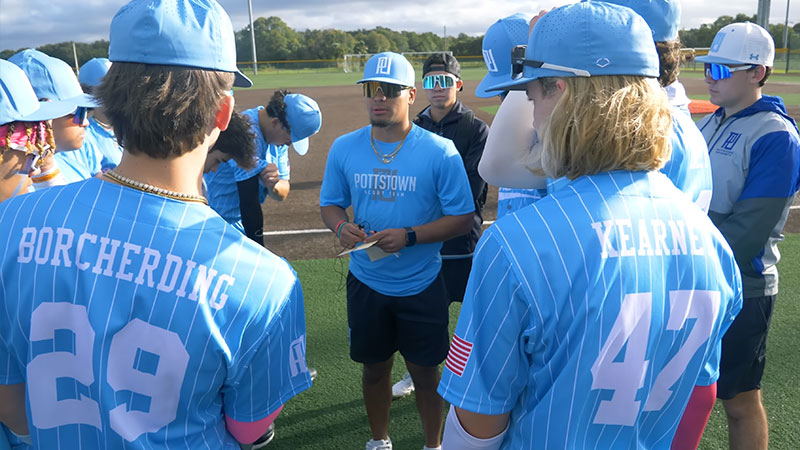
Baseball teams typically travel by charter flights or buses, depending on the distance between games.
For longer distances, such as cross-country trips, teams often use chartered planes to minimize travel time and maximize comfort.
These flights are arranged by the team’s travel coordinator or manager and are tailored to fit the team’s schedule, ensuring they arrive at their destination well-rested and ready to play.
Teams may opt for buses for shorter distances or when traveling within a region. While bus travel is more time-consuming than flying, teams can bond and strategize together.
Additionally, buses provide flexibility in scheduling and can accommodate larger groups of players, coaches, and staff.
Whether by air or land, the mode of transportation chosen prioritizes the team’s comfort, convenience, and readiness for their upcoming games.
How to Make a Travel Baseball Team?
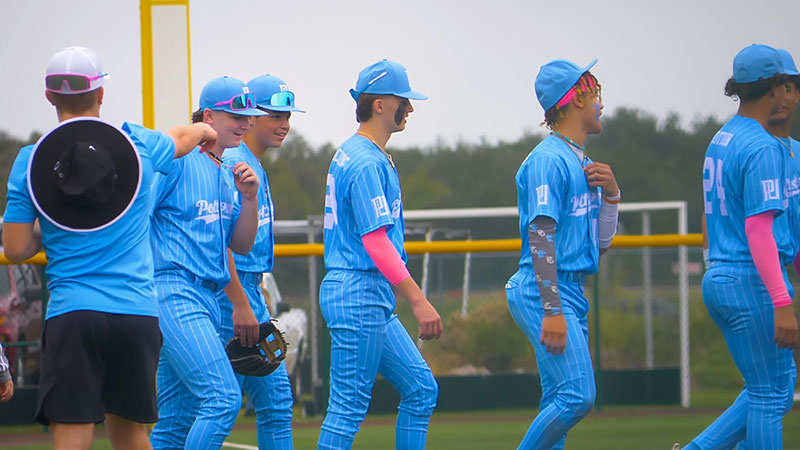
Creating a travel baseball team requires careful planning, organization, and dedication from coaches and players.
Travel baseball teams are often formed to provide young athletes with enhanced competition and opportunities for skill development beyond recreational leagues. Here’s a guide on how to make a travel baseball team:
Define Your Objectives
Before forming a travel baseball team, it’s essential to establish clear objectives. Determine the age group you’ll be focusing on, the level of competition you aim to participate in, and the team’s overall philosophy.
Are you prioritizing player development, winning tournaments, or balancing both?
Recruitment and Tryouts
Host tryouts to evaluate players interested in joining the team. Advertise tryout dates and locations to attract a diverse pool of talent.
During tryouts, assess players based on their skills, athleticism, attitude, and coachability.
Be transparent about your team’s expectations and commitment requirements to ensure players and their families are fully informed.
Coaching Staff
Assemble a knowledgeable and experienced coaching staff committed to player development.
Coaches should possess a strong understanding of rage baseball fundamentals, practical communication skills, and a passion for teaching.
Consider coaches who prioritize the holistic development of athletes, both on and off the field.
Establish Team Culture
Cultivate a positive and supportive team culture centered around sportsmanship, respect, and accountability. Encourage camaraderie among players and emphasize the importance of teamwork.
Define team goals collaboratively and foster an environment where players feel motivated to work hard and continuously improve.
Tournament Selection and Scheduling
Research and select tournaments that align with your team’s skill level and development goals. Consider factors such as location, level of competition, and cost when choosing events to participate in.
Develop a comprehensive tournament schedule that balances competitive play with rest and recovery to prevent burnout among players.
Player Development Program
Implement a structured player development program that addresses technical skills, physical conditioning, and mental preparation.
Provide regular practice sessions focused on individual skill development, team strategies, and game simulations.
Offer opportunities for players to receive feedback, set personal goals, and track their progress throughout the season.
By following these steps and maintaining a commitment to excellence, you can create and nurture a competitive travel baseball team dedicated to fostering the growth and development of young athletes.
How to Get on a Travel Baseball Team?
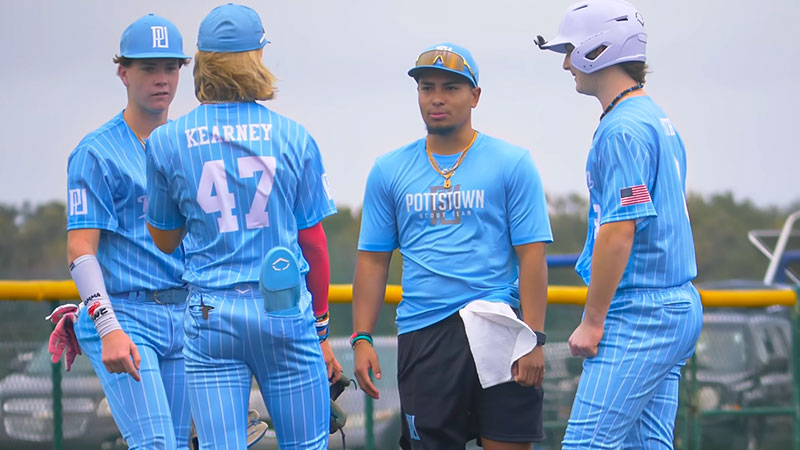
Getting on a travel baseball team involves several steps, from identifying potential teams to showcasing your skills during tryouts. Here’s a guide on how to get on a travel baseball team:
Research Travel Teams
Start by researching travel baseball teams in your area or surrounding regions. Look for teams that cater to your age group and skill level.
You can find information about teams through online searches, social media, local baseball associations, or by asking coaches and other players for recommendations.
Attend Tryouts
Most travel baseball teams hold tryouts to evaluate prospective players. Watch for tryout announcements from teams you’re interested in joining.
Attend as many tryouts as possible to increase your chances of finding the right fit. Pay attention to tryout dates, locations, and any registration requirements.
Prepare for Tryouts
Before tryouts, practice and refine your rage baseball skills to showcase your abilities effectively—work on hitting, fielding, throwing, and baserunning skills.
Additionally, demonstrate a positive attitude, coachability, and good sportsmanship during tryouts. Dress appropriately in baseball attire and bring any required equipment, such as a glove, bat, and cleats.
Showcase Your Skills
During tryouts, give your best effort and showcase your skills confidently. Listen to instructions from coaches and demonstrate your ability to follow directions.
Support other players and exhibit a positive attitude throughout the tryout process. Stay focused, even if you make mistakes, and use each opportunity to highlight your strengths.
Communicate with Coaches
If you want to join a specific team, express your interest to the coaches during tryouts or follow-up emails. Ask questions about the team’s philosophy, expectations, and commitment requirements.
Demonstrate your enthusiasm for playing and willingness to contribute positively to the team’s success.
Stay Persistent and Open-Minded
Getting on a travel baseball team can be competitive, and you may not make the first team you try out for. Stay persistent in your pursuit and continue attending tryouts for different teams until you find the right fit.
Keep an open mind and be receptive to coach feedback, as it can help you improve and increase your chances of making a team.
By following these steps and demonstrating your skills and dedication, you can increase your chances of getting on a travel baseball team and enjoying the opportunities for growth and competition that come with it.
How To Leave A Travel Baseball Team?
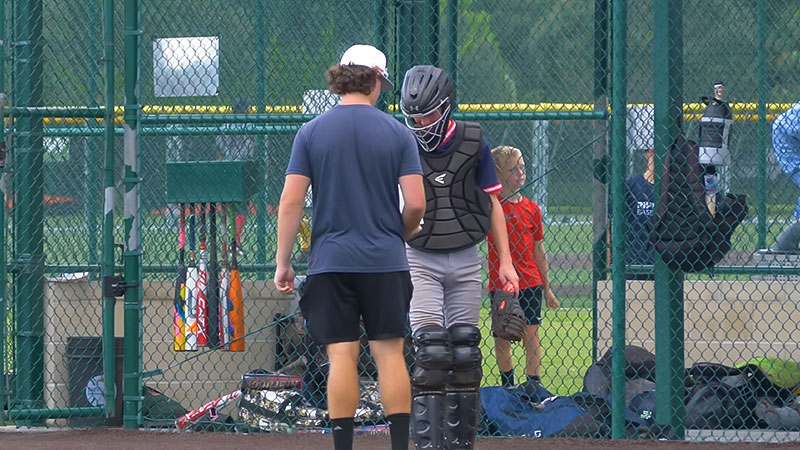
Leaving a travel baseball team is a decision that should be made thoughtfully and respectfully, considering its impact on the team and your teammates. Here’s a guide on how to leave a travel baseball team:
Reflect on Your Decision
Before taking any action, take some time to reflect on your decision to leave the team.
Consider your reasons for leaving and evaluate whether they are valid and reasonable. Being honest with yourself about your motivations for departing the team is essential.
Notify the Coach or Team Manager
Once you decide to leave, inform the coach or team manager immediately. Schedule a meeting or have a private conversation with them to discuss your decision.
Be honest and respectful when explaining your reasons for leaving. Provide sufficient notice, ideally before a new season or significant event, to allow the team to make necessary adjustments.
Express Gratitude
Express gratitude to the coach, teammates, and other organization members for your opportunities and experiences while being part of the team.
Acknowledge the support and guidance you’ve received and the relationships you’ve built with the team.
Return Team Equipment
If you’ve received any team equipment, such as uniforms, gear, or training materials, make arrangements to return them promptly.
This demonstrates respect for the team’s resources and helps ensure they are available for other players.
Maintain Professionalism
While leaving the team, maintain professionalism and uphold a positive attitude.
Avoid speaking negatively about the team or its members, even if you have disagreements or concerns. Remember that how you handle your departure reflects on your character and reputation within the baseball community.
Stay Connected (Optional)
Considering your circumstances and relationships with teammates, consider staying connected with the team even after leaving.
You may attend games as a spectator to show support or keep in touch with former teammates and coaches. Maintaining positive relationships can be beneficial in the future and demonstrates maturity and sportsmanship.
By following these steps, you can leave a travel baseball team gracefully and respectfully, minimizing potential disruptions and preserving your reputation within the baseball community.
Is Switching Travel Baseball Teams A Good Idea?
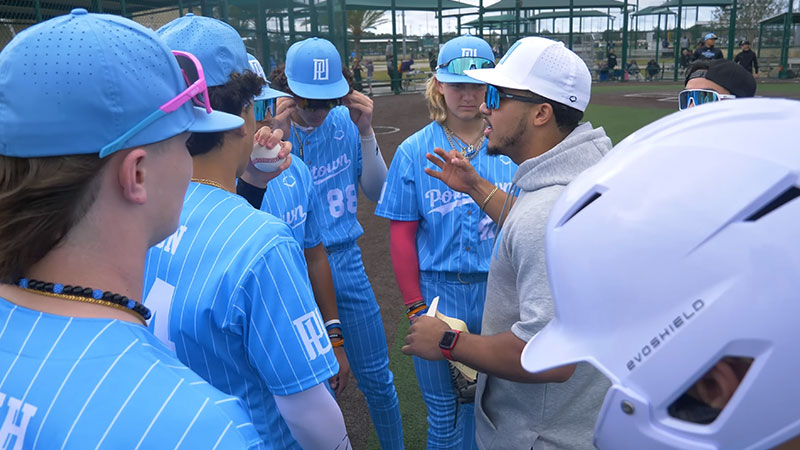
Switching travel baseball teams can be a good idea under certain circumstances, but it’s essential to approach the decision thoughtfully and consider various factors before making a change.
Here are some considerations to help you determine if switching travel baseball teams is a good idea for you:
Development Opportunities
Evaluate whether switching teams will provide better opportunities for your development as a player. Consider factors such as coaching quality, playing time, level of competition, and access to resources and facilities.
If you believe that joining a different team will offer you a more conducive environment for growth and improvement, it may be worth considering a switch.
Team Dynamics
Reflect on your experiences with your current team and assess the team dynamics.
If you face communication issues, conflicts with teammates or coaches, or a lack of cohesion, switching to a different team with a more positive and supportive atmosphere could benefit your enjoyment and performance.
Personal Goals and Priorities
Consider your personal goals and priorities as a player. Are you primarily focused on competitive success, skill development, or enjoying the game with friends?
Determine whether the culture and objectives of your current team align with your aspirations. If not, exploring other options may be necessary to find a better fit for your goals.
Commitment and Sacrifices
Assess the commitment level required by your current and potential new teams. Consider travel commitments, financial obligations, practice schedules, and time away from other activities.
Ensure you’re prepared to make any necessary sacrifices and commitments to join a new team.
Impact on Relationships
Reflect on the potential impact of switching teams on your relationships with teammates, coaches, and parents. Consider how your decision may affect team dynamics and your connections within the baseball community.
Communicate openly and respectfully with those involved to minimize potential tensions or misunderstandings.
Long-Term Considerations
Think about the long-term implications of switching teams. Consider how joining a new team may affect your opportunities for future advancement, college recruitment, and overall trajectory as a baseball player.
Choose a team that aligns with your long-term goals and aspirations within the sport.
Whether switching travel baseball teams is a good idea depends on your circumstances, goals, and priorities as a player.
Take the time to carefully evaluate your options and make an informed decision that aligns with your best interests and aspirations in baseball.
FAQs
How to start a travel baseball team?
Starting a travel baseball team involves defining objectives, recruiting players, assembling a coaching staff, securing funding, and scheduling tournaments.
Establishing a clear vision, promoting tryouts, and fostering a positive team culture are essential to building a successful program.
How do baseball players travel?
Baseball players primarily travel by charter flights or buses, depending on the distance between games. For long distances, teams often charter planes for efficiency and comfort.
For shorter trips, buses provide flexibility and allow players to bond during the journey, promoting team cohesion.
How do you start a select baseball team?
Starting a select baseball team entails defining goals, recruiting talented players, assembling a skilled coaching staff, securing facilities, and organizing tournaments.
Emphasizing player development, fostering a supportive team culture, and providing opportunities for competition and growth are crucial for success.
Is quitting travel baseball a good idea?
Quitting travel baseball can be a good idea if it no longer aligns with your goals, interests, or priorities.
Consider factors such as time commitment, financial costs, personal enjoyment, and development opportunities. Ultimately, prioritize your well-being and choose a path that brings fulfillment and satisfaction.
Wrapping Up
Leaving a travel baseball team is a significant decision that requires careful consideration and respect for all parties involved.
Following the steps outlined in this guide, you can navigate the process with professionalism and integrity, minimizing potential disruptions and preserving positive relationships within the baseball community.
Remember to communicate openly, express gratitude for your experiences, and maintain a positive attitude throughout the transition.
Prioritizing your well-being and aligning your decisions with your goals and aspirations will lead to a smoother departure and pave the way for new opportunities in your baseball journey. Thank you very much.







